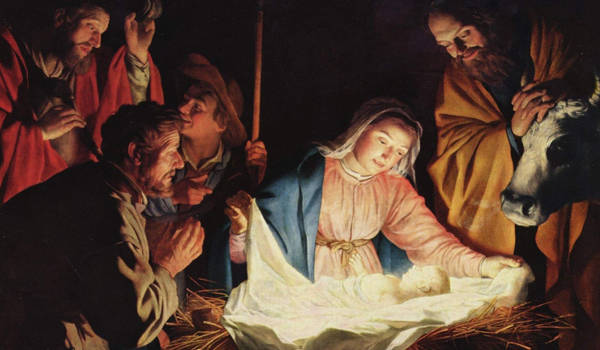
The earliest Christmas celebrations in Rome started around the mid-fourth century AD. These celebrations had a very strong Christological and dogmatic character, for the early church was still fighting the Arian Heresy. By celebrating Christmas – ‘the word becoming flesh’ – the church emphasized the Incarnation of Christ, the Son of God and the Savior of the world.
Today, there are a several feasts connected with the liturgical celebrations of Christmas. The two octaves of Christmas include the Feasts of the Holy Family, Mary Mother of God, Epiphany, and the Baptism of the Lord. They speak to us of the immense love of God ‘who sent His only begotten Son’ that we all may become His true children. The different Masses we celebrate on Christmas, utilize different readings to bring out the different aspects of this mystery of God’s Love.
Through the narration of the genealogy at the vigil, Matthew connects Jesus to Abraham and David and to all the prophecies given in the Old Testament. At the Midnight Mass, we are invited to contemplate the mystery of the infinite and indescribable God becoming a simple baby at Bethlehem – ‘a child is born to us.’ At the Christmas Day liturgy, John connects the Incarnation to the entirety of creation by tying it to before the beginning of time and space. Now creation is renewed: The light of God is come to us – “the light shines in the darkness” (Jn 1: 5) – and John testifies that ‘they have seen His Glory, the glory as of a Father’s only Son, full of grace and truth’ (Jn 1:14). This light, for John, will free us from death on the darkest day of Good Friday.
The Christmas liturgies present to us the Child born as the Savior of the world. The story of Christmas becomes meaningful for us only if we read it in the paradox of its situation (poverty – glory) and apply it to our time and culture. God is born to us as a helpless baby, in an utter destitution, in a manger far from all family and friends, without any assistance, and was visited only by a few shepherds who were considered social outcasts. Yet, heavens proclaimed His glory through innumerous hosts of angels. He is proclaimed as ‘God with us.’
We need Christ to be born in our times. We need a birth of a savior in our darkened world situation. We need a resurgence of hope which a tiny star proclaimed in the distant past at Christ’s birth. We need a spark of light to rekindle our faith. We need Christ ever more than before. We need Him to be born again and again.
May this Christmas fill us with the love and joy of God. Let our Christmas Liturgies create within us a new fervor for faith and make us committed members of His Kingdom.
I wish you, all my friends (parishioners), a Merry Christmas.
– Fr. Ranjan D’Sa

